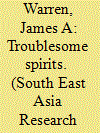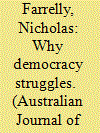| Srl | Item |
| 1 |
ID:
117184


|
|
|
|
|
| Publication |
2012.
|
| Summary/Abstract |
The spilling of blood in modern political protest is an exceptional event. This article discusses the deployment of blood as a means of struggle by the members of an extra-parliamentary movement, known as the 'red shirts', in March 2010, in the course of their prolonged attempt to topple the government of the Thai prime minister Abhisit Vejjajiva. Two contesting discourses of blood are discussed: the symbolic discourse of blood as a self-sacrificial act deployed by the protesters to curse their enemies, and the medical counter-discourse deployed by the authorities, in an effort to neutralise the protesters' act. Several issues raised by the blood-spilling act are examined: its perceived appropriateness, its ritual roots and its disputed effectiveness as a curse. In conclusion, it is suggested that the blood ritual constitutes a reflective move to counter the prevailing 'regime of images' in Thai society.
|
|
|
|
|
|
|
|
|
|
|
|
|
|
|
|
| 2 |
ID:
126643


|
|
|
|
|
| Publication |
2013.
|
| Summary/Abstract |
Although alcohol has long been a feature of Thai society, historical evidence indicates that excessive drinking on a regular basis is a relatively recent phenomenon. During the nineteenth century, there were significant quantitative and qualitative changes in both alcohol consumption and production in Siam, due largely to the introduction of new alcoholic beverages and methods of distillation by Chinese immigrants and Western entrepreneurs. As public drunkenness became more common, excessive drinking was blamed for an apparent increase in violent crime throughout the kingdom. This paper examines how the Thai government tried to manage the upsurge in drunken behaviour and the obstacles it faced in doing so. Most of these problems stemmed from the limits on the kingdom's fiscal and judicial sovereignty imposed by the unequal treaties it had signed with the Western imperial powers; as such, they are indicative of Siam's semi-colonial status during this period.
|
|
|
|
|
|
|
|
|
|
|
|
|
|
|
|
| 3 |
ID:
121664


|
|
|
|
|
| Publication |
2013.
|
| Summary/Abstract |
Since the revolution of 1932 that ended absolute monarchy, Thailand has experienced sporadic military interventions, with 19 coups and coup attempts over those decades. This article explains these military interventions by emphasising the cultural aspects of Thai coup-making at the elite level. Concretely, the article shows that episodic military interventionism-supported by significant and persistent military influence in politics-is now part of a distinctive elite coup culture. In contrast to other so-called 'coup-prone' states, Thailand has largely accommodated military interventionism, especially by accepting the defence of the monarchy as a justification for toppling elected governments. Thailand's reluctance to redemocratise, and the haphazardness of the resulting institutional configurations, suggests that Thailand's elite-and, to some extent, the public as well-have deeply internalised the ultimate acceptability of coups. The test of this arrangement may come with the end of King Bhumibol Adulyadej's reign and the potential realignment of military influence in Thai society.
|
|
|
|
|
|
|
|
|
|
|
|
|
|
|
|